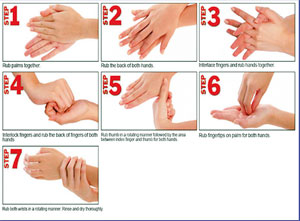You go in for one illness and come out with another, causing double trouble.
This is trouble in the form of hospital-associated infections, MediScene learns.
Defining hospital-associated or nosocomial infections, Consultant Microbiologist Dr. Rohan Chinniah who is a Senior Lecturer at the Colombo Medical Faculty says these are infections that were neither present nor incubating within a person at the time he/she is admitted to the health-care facility. “They may appear even after the patient is discharged.”
 |
He cites the hypothetical case of a patient who seeks admission to a hospital for a hernia operation. If he gets chicken pox in a week, he has got the bug before entering hospital but if it occurs 10-20 days after admission to the health-care facility, then health experts will deem that it has been acquired from the hospital. “For chicken pox the incubation period ranges from 10-20 days,” explains Dr. Chinniah. The incubation period is the time between the exposure of a person to a pathogen (an agent of disease) and the appearance of symptoms. Pathogens or germs are living micro-organisms that come in different forms such as bacteria, viruses, fungi etc.
In surgical site infections, it is more problematic, according to him. If an infection occurs at a surgical site within 30 days of the surgical procedure, then it is taken as a surgical site infection which is a hospital-associated infection, while an implant could cause such an infection within one year. “If the surgical scar site gets infected on the 29th day, we will dub it a hospital associated infection and if a similar infection occurs on the 360th day after a hip replacement, it would be the same,” says Dr. Chinniah.
The pathogens that worry microbiologists most with regard to hospital-associated infections are:
- MRSA or meticillin-resistant Staphylococcus aureus – this is a bacterium that causes infections in different parts of the body. The symptoms of MRSA depend on where the infection is. Often it causes mild infections on the skin, causing sores or boils. But it can also cause more serious skin infections or infect surgical wounds, the bloodstream, the lungs or the urinary tract. MRSA is sometimes called “super bug” because it is drug-resistant and hard to treat.
- Multi-drug resistant pseudomonas – these are bacteria that opportunistically infect people, especially those who are immuno-compromised, suffered burns, have catheters fixed or are on respirators. Pseudomonas may cause urinary tract infections, sepsis or bloodstream infections, pneumonia and other medical problems. These bacteria can infect many sites including the skin, subcutaneous tissue, bone, ears, eyes, urinary tract and heart valves.
Multi-drug resistant coliforms particularly acinetobacter – these are faecal coliforms which develop a resistance to drugs causing pneumonia, skin and wound infections, urinary tract infection blood infections. Bloodstream infections caused by acinetobacter tend to be the most severe.
Referring to the routes of cross-infection, Dr. Chinniah says it can be airborne through droplets, dust, skin scales, aerosols or air-conditioning systems; infected food and drink through outbreaks; direct contact through hands and clothing of staff; inanimate objects through instruments, irrigation fluids and infusion fluids; or less frequently through vectors such as flies and mosquitoes.
But he emphasised that direct contact through the hands and clothing of health-care workers is the most important way of cross-infection in a health-care setting, adding that standard precautions should be applied to all patients at all times, regardless of diagnosis or infectious status. The organisms present in the high antibiotic pressure environment of hospitals where there is much antibiotic use and patients are confined over prolonged periods could well result in drug-resistance.
Citing an example, he says a health-care worker, be it a doctor, nurse or minor staffer, may attend or see to the needs of Patient A on Bed 1 and if they don’t take care to wash their hands carry the infection to Patient B on Bed 2. “The bridge for infections will be the hands of the health-care workers.”
He dispels the misconception that many visitors for a patient will be a major contributory factor in spreading infection. “This is much less important than the unwashed hands of health-care workers,” he says.
Answering the question: When considering whether to clean hands, a health-care worker should regard that whatever is attached to the patient is considered part of the patient. So even if a health-care worker adjusts the flow of an IV line, he should wash his hands before and after attending to it. Even the bedside cupboard etc of a patient is considered his surroundings. Hence he or she should wash their hands after touching objects in the environment of the patients.
In Sri Lanka, each hospital ward has a sink with a tap, soap and a towel, but sometimes health-care workers may not think it important or consider it a waste of time to walk back to the sink after attending to each patient. The towel could also be soiled, leading to the spread of infection unless the hospital provides a single-use washable towel. In the west, of course, and in most of the private sector hospitals in Sri Lanka, alcohol-based hand sanitizers are available for health workers. When compared to the costs patients and hospitals face with cross-infections, hand sanitizers as well as more sinks and liquid soap in wards should be promoted, he points out.
Quoting Florence Nightingale, Dr. Chinniah says the “very first requirement in a hospital is that it should do the sick no harm”.
Hand hygiene important
The single most important act for the control of infection is hand-washing and hand hygiene by the health-care workers, emphasized Dr. Chinniah, pointing out that it removes harmful organisms.
Hand washing too should be done the right way and hand washing skills are part of the routine training among the health-care workers because clean hands save lives, MediScene understands. |
